- Home
- P. D. James
A Taste for Death Page 18
A Taste for Death Read online
Page 18
They were both experienced detectives, they knew the importance at this stage of keeping the detection rational, of concentrating on the physical, ascertainable facts. Which of the suspects has the means, the opportunity, the knowledge, the physical strength, the motive? It was unproductive so early in the investigation to begin asking: Has this man the ruthlessness, the nerve, the desperation, the psychological make-up to commit this particular crime? And yet, seduced by the fascination of human personality, they nearly always did.
six
In the small back bedroom on the second floor of 49 Crowhurst Gardens, Miss Wharton lay rigidly awake and stared into the darkness. Her body, pressed into the hard mattress, felt unnaturally hot and heavy as if weighted with lead. Even to turn in search of greater comfort was too great an effort. She hadn’t expected to sleep soundly, but she had gone through her nightly routine with a dogged hope that adhering to these small and comforting rituals would deceive her body into slumber or at least into quietude; the chapter of Scripture prescribed in her book of devotions, the hot milk, the one digestive biscuit, final indulgence of the day. None had worked. The passage from St. Luke’s Gospel had been the parable of the good shepherd. It was one of her favourites, but tonight she had read it with a sharpened, perversely questioning mind. What, after all, was a shepherd’s job? Only to care for the sheep, to make sure they didn’t escape so that they could be branded, sheared and then slaughtered. Without the need for their wool, their flesh, there would be no job for the shepherd.
Long after she had closed her Bible she lay rigid for what seemed an endless night, her mind burrowing and scurrying like a tormented animal. Where was Darren? How was he? Who was making sure that he wasn’t lying uncomforted or distressed? He hadn’t seemed too affected by the horror of that awful scene, but with a child one never knew. And it was her fault that they were cut off from each other. She should have insisted on knowing where he lived, meeting his mother. He had never spoken of his mother, and when she had asked him he had shrugged and not replied. She hadn’t liked to press it. Perhaps she could reach him through the police. But ought she to worry Commander Dalgliesh when he had two murders to solve?
And the word “murder” brought on a new anxiety. There was something she ought to remember but couldn’t; something she ought to have told Commander Dalgliesh. He had questioned her briefly, gently, sitting beside her on one of the small chairs in the children’s corner of the church, as if uncaring, even unaware, how oddly it suited his tall figure. She had tried to be calm, accurate, matter-of-fact, but she knew there were gaps in her memory, that there was something the horror of the scene had blotted out. Yet what could it be? It was something small, possibly insignificant, but he had said she must tell him every detail, however trivial.
But now another and more immediate worry surfaced. She needed to go to the lavatory. She switched on her bedside light, fumbled for her spectacles and peered at the carriage clock ticking gently on her bedside table. It was only ten past two. There was no hope of waiting until morning. Although she had her own sitting room, bedroom and kitchen, Miss Wharton shared the bathroom with the McGraths in the flat below. The plumbing was old-fashioned, and if she had to use the lavatory in the night, Mrs. McGrath would complain next morning. The alternative was to use her chamber pot, but that had to be emptied and the whole morning would be dominated by her anxious listenings to know when it would be safe to carry it down to the lavatory without meeting Mrs. McGrath’s bold, contemptuous eyes. Once she had bumped into Billy McGrath on the stairs with the covered pot in her hand. The memory of it still burned her cheeks. But she would have to use it. The night was still so quiet she couldn’t face creeping down to shatter its peace with cascades of swirling water, those long-drawn-out shakes and grumbles of the pipes.
Miss Wharton didn’t know why the McGraths disliked her so much, why her inoffensive gentility should be so provocative to them. She tried to keep out of their way, although this wasn’t easy when they shared the same front door, the same narrow entrance passage. She had explained Darren to them on his first visit to her room by telling them that his mother worked at St. Matthew’s. The lie, blurted out in panic, had seemed to satisfy them, and she had subsequently put it resolutely out of her mind since she could hardly include it in her weekly confession and Darren was so swift in his comings and goings that there was little risk they would question him. It was as if he sensed that the McGraths were enemies, better avoided than encountered. She attempted to propitiate Mrs. McGrath with a desperate over-politeness and even by small acts of kindness: taking her milk bottles in out of the sun in summer, leaving a jar of homemade jam or chutney on her doorstep when she came home from St. Matthew’s Christmas Fair. But these signs of weakness seemed only to increase their enmity, and she knew in her heart that there was nothing to be done about it. People, like countries, needed someone weaker and more vulnerable than themselves to bully and despise. This was what the world was like. As she gently dragged the chamber pot from under the bed and crouched over it, muscles tense, trying to regulate and quieten the flow, she thought again how much she would have liked to have a cat. But the garden, twenty yards of unmown grass, hummocky as a field, surrounded by an almost obliterated border of overgrown rose bushes and torn, unflowering shrubs, belonged to the bottom flat. The McGraths would never let her have use of it, and it wouldn’t be fair to keep a cat cooped up all night and day in her own two small rooms.
Miss Wharton had been taught to fear in her childhood, and it isn’t a lesson children can ever unlearn. Her father, a schoolmaster in an elementary school, had managed to maintain a precarious tolerance in the classroom by a compensating tyranny in his own home. His wife and three children were all afraid of him. But shared fear hadn’t brought the children closer. When, with his usual irrationality, he would single out one child for his displeasure, the siblings would see in each other’s shamed eyes their relief at this reprieve. They learned to lie to protect themselves, and were beaten for lying. They learned to be afraid, and were punished for cowardice. And yet, Miss Wharton kept on her side table a silver-framed photograph of both her parents. She never blamed her father for past or present unhappiness. She had learned her lesson well. She blamed herself.
She was now virtually alone in the world. Her younger brother, John, to whom she had been closest, more psychologically robust than his siblings, had fared best. But John had been burnt alive in the rear gun turret of his Lancaster bomber the day before his nineteenth birthday. Miss Wharton, mercifully ignorant of the steel-bound inferno in which John had screamed away his life, had been able to prettify his death into the peaceful picture of the single German bullet finding the heart, the young, pale-faced warrior being gently wafted earthwards, his hands still resting on his gun. Her older brother, Edmund, had emigrated to Canada after the war and now, divorced and childless, worked as a clerk in some small northern town whose name she could never remember since he so seldom wrote.
She slid the chamber pot back under the bed, then put on her dressing-gown and padded on naked feet across the narrow hall and into her front sitting room to the single window. The house was very quiet. Under the lights the street shone ebony black between the banks of parked cars. Even with her window closed she could hear the muted roar of night traffic along the Harrow Road. It was a night of low cloud, stained red with the glare of the restless city. Sometimes it seemed to Miss Wharton, looking out into that eerie half-darkness, that London was built on coal and was perpetually smouldering, that Hell, unrecognized, was all around her. To the right, silhouetted against the hectic glow, was the campanile of St. Matthew’s. Usually it gave her comfort. Here was a place where she was known, valued for the small services she could give, kept busily occupied, solaced, shriven and at home. But now the thin, alien tower, stark against the ruddy sky, was a symbol of horror and death. And her twice-weekly walk to St. Matthew’s along the towpath: how could she face that now? The path had seemed to her mysteriously exempt f
rom the terrors of the city streets, except for those brief stretches of dark tunnel. Even on the darkest mornings she had walked there in blessed freedom from fear. And in recent months she had had Darren. But now Darren was gone, safety was gone, the towpath would always be slippery with imagined blood. As she crept back to bed her mind journeyed across the roofs to the Little Vestry. It would be empty now, of course. The police would have taken the bodies away. The black windowless van had been parked there ready even before she had left. There would be nothing now but the bloodstains browning on the carpet—or would that, too, have been taken away? Nothing but emptiness and darkness and the smell of death, except in the Lady Chapel, where the sanctuary light would still be gleaming. Was she to lose even this? she wondered. Was this what murder did to the innocent? Took away the people they loved, loaded their minds with terror, left them bereft and unfriended under a smouldering sky.
seven
It was after eleven thirty when Kate Miskin clanged the lift door behind her and unlocked the security lock of her flat. She had wanted to wait at the Yard until Dalgliesh and Massingham had returned from seeing Halliwell. But AD had suggested that it was time she called it a day and there was little more that she or anyone could do until the morning. If AD was right, and Berowne and Harry Mack had both been murdered, she and Massingham could be regularly working a sixteen-hour day, sometimes longer. It wasn’t a possibility she feared; she had done it before. As she switched on the light and double-locked the door behind her, it struck her as odd, perhaps even reprehensible, that she should be hoping that AD was right. Then almost immediately she absolved herself with the universal and comforting platitude. Both Berowne and Harry were dead; nothing could bring them back. And if Sir Paul Berowne hadn’t slit his own throat, then the case promised to be fascinating as well as important, and not only to her personally, to her chance of promotion. There had been a certain amount of opposition to the setting up in C1 of a special squad to investigate serious crimes which were thought to be politically or socially sensitive, and she could name a number of senior officers who wouldn’t be sorry if this, their first case, collapsed into a commonplace tragedy of murder followed by suicide.
She entered her flat, as always, with a sense of satisfaction, of coming home. She had lived in Charles Shannon House for just over two years; buying the flat on a carefully calculated mortgage had been the first step in a planned upward progress, even eventually to one of the converted warehouses on the Thames—wide windows overlooking the river, huge rooms with their bare rafters, a distant view of Tower Bridge. But this was a beginning. She rejoiced in it and sometimes had to prevent herself from prowling round, touching the walls, the furniture, to reassure herself of its reality.
The flat, a long sitting room with a narrow iron balcony running its whole width, two small bedrooms, a kitchen and a bathroom and separate lavatory, was on the top floor of a Victorian block just off Holland Park Avenue. It had been built in the early 1860s to provide studios for artists and designers in the growing arts and crafts movement, and a couple of blue commemorative plaques over the door testified to its historic interest. But architecturally it was without merit, an aberration of yellowish London brick set amidst the surrounding Regency elegance, immensely tall, castellated and incongruous as a Victorian castle. The soaring walls, broken by numerous carved and oddly proportioned windows and criss-crossed with iron fire escapes, rose to a roof topped with rows of chimney pots between which sprouted a variety of television aerials, some long defunct.
It was the only place she had ever thought of as home. She was illegitimate and had been brought up by her maternal grandmother, who had been nearly sixty when she was born. Her unmarried mother had died within days of her birth and was known to her only as a thin, serious face in the front row of a school photograph, a face in which she could recognize none of her own strong features. Her grandmother had never spoken of her father, and she had assumed that her mother had never divulged his identity. She was fatherless even in name, but it had long ceased to worry her if it ever had. Apart from the inevitable fantasies of early childhood when she had pictured her father seeking her out, she hadn’t known any urgent need to discover her roots. Two half-remembered lines of Shakespeare which had met her eyes when she had casually opened the book in the school library had become for her the philosophy by which she intended to live.
What matters it what went before or after,
Now with myself I will begin and end.
She hadn’t chosen to furnish her flat in a period style. She had little feeling for the past; all her life had been a striving to struggle free of it, to make a future fashioned to her own need for order, security, success. So she had lived for a couple of months with nothing but a folding table, one chair and a mattress on the floor, until she had saved the money to buy the austere, well-designed modern furniture she liked: the sofa and two easy chairs in real leather, the dining table and four chairs in polished elm, the fitted bookcase completely covering one wall, the sleek, professionally designed kitchen which held the minimum of necessary utensils and crockery but nothing superfluous. The flat was her private world kept inviolate from colleagues in the police. Only her lover was admitted, and when Alan had first stepped through the door, uncurious, unthreatening, carrying as always his plastic bag of books, even his gentle presence had seemed for a moment a dangerous intrusion.
She poured herself an inch of whisky, mixed it with water, then unlocked the security lock of the narrow door which led from the sitting room to the iron balcony. The air rushed in, fresh and clean. She closed the door, then stood, glass in hand, leaning back against the brickwork and staring out eastward over London. A low bank of heavy cloud had absorbed the glare of the city’s lights and lay, palely crimson, like a colourwash carefully laid against the richer blue-black of night. There was a light breeze, just strong enough to stir the branches of the great limes lining Holland Park Avenue and to twitch the television aerials which sprouted like frail exotic fetishes from the patterned roofs fifty feet below. To the south the trees of Holland Park were a black curdle against the sky, and ahead the spire of St. John’s Church gleamed like some distant mirage. It was one of the pleasures of these moments, seeing how the spire appeared to move, sometimes so close that she felt that she would only have to stretch out a hand to feel its harshly textured stones, sometimes, like tonight, as distant and insubstantial as a vision. Far below to her right under the high arc lights the avenue ran due west, greasy as a molten river, bearing its unending cargo of cars, trucks and red buses. This, she knew, had once been the old Roman road leading westward straight out of Londinium; its constant grinding roar came to her only faintly, like the surge of a distant sea.
Whatever the time of year, except in the worst of winter weather, this was her nightly routine. She would pour one whisky, Bell’s, and take out the glass for these minutes of contemplation, rather, she thought, like a caged prisoner reassuring herself that the city was still there. But her small flat was no prison, rather the physical affirmation of a freedom hard won and jealously maintained. She had escaped from the estate, from her grandmother, from that meanly proportioned, dirty, noisy flat on the seventh floor of a post-war tower block, Ellison Fairweather House, monument to a local councillor passionately dedicated, like most of his kind, to the destruction of small neighbourhood streets and the erection of twelve-storey monuments to civic pride and sociological theory. She had escaped from the shouting, the graffiti, the broken lifts, the stink of urine. She remembered the first evening of her escape, the eighth of June over two years ago. She had stood where she stood now and poured her whisky like a libation, seeing the momentary arc of liquid light as it fell between the grating, saying aloud “Sod you, Councillor Bloody Fairweather. Welcome, freedom.”
And now she was really on her way. If she made a success of this new job, anything—well, almost anything—was possible. It was perhaps not surprising that AD would choose at least one woman for his squad. But
he wasn’t the man to make routine gestures to feminism, or to any other fashionable causes, come to that. He had selected her because he needed a woman in the squad and because he knew her record, knew that he could rely on her to do a good job. Looking out over London, she felt confidence surge through her veins strong and sweet as the first conscious breath of morning. The world stretched out below her was one she was at home in, part of that dense, exciting conglomerate of urban villages which made up the Metropolitan Police district. She pictured it stretching away over Notting Hill Gate, over Hyde Park and the curve of the river, past the towers of Westminster and Big Ben, briefly over that anomaly the patch of the City of London Police, then on to the eastern suburbs to the boundary with the Essex Constabulary. She knew almost to a yard where that boundary lay. This was how she saw the capital, patterned in police areas, districts, divisions and sub-divisions. And immediately below her lay Notting Hill, that tough, diverse, richly cosmopolitan village where she had been posted after leaving the preliminary training school. She could remember every sound, colour, smell as strongly as on that torrid August night eight years ago when it had happened, the moment she knew that her choice had been right and that this was her job.
She had been on foot patrol in Notting Hill with Terry Read on the hottest August night in living memory. A boy, almost squealing with excitement, had rushed at them and, gibbering, had pointed to a nearby tenement. She saw it again: the huddle of frightened neighbours at the foot of the stairs, faces gleaming with sweat, stained shirts stuck to steaming bodies, a smell of hot, unwashed humanity. And above the whispers a raucous voice from upstairs shouting its unintelligible protest. The boy said:

 The Skull Beneath the Skin
The Skull Beneath the Skin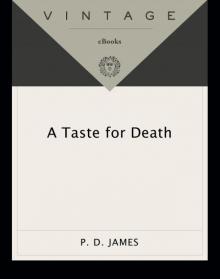 A Taste for Death
A Taste for Death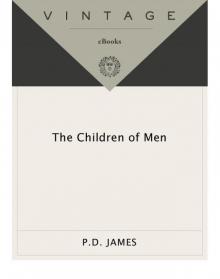 The Children of Men
The Children of Men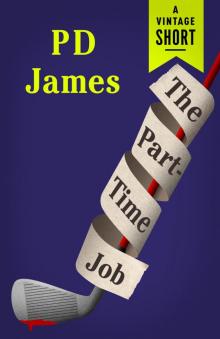 The Part-Time Job
The Part-Time Job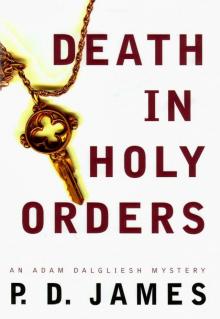 Death in Holy Orders
Death in Holy Orders The Victim
The Victim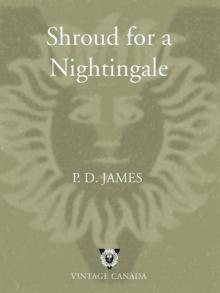 Shroud for a Nightingale
Shroud for a Nightingale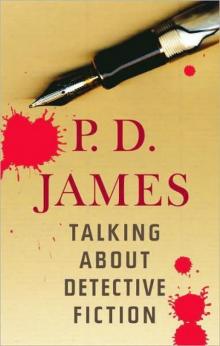 Talking about Detective Fiction
Talking about Detective Fiction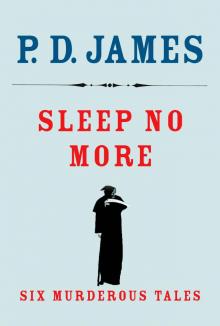 Sleep No More
Sleep No More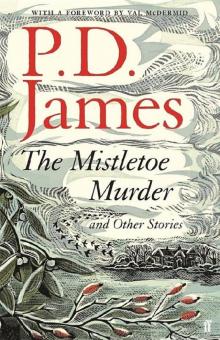 The Mistletoe Murder and Other Stories
The Mistletoe Murder and Other Stories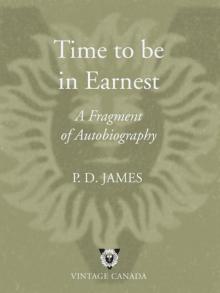 Time to Be in Earnest
Time to Be in Earnest Original Sin
Original Sin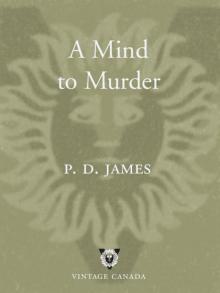 A Mind to Murder
A Mind to Murder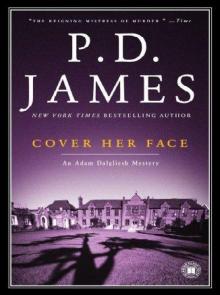 Cover Her Face
Cover Her Face Innocent Blood
Innocent Blood Devices and Desires
Devices and Desires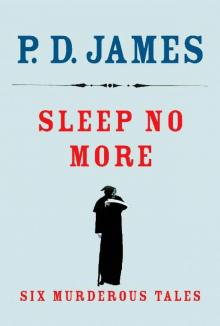 Sleep No More: Six Murderous Tales
Sleep No More: Six Murderous Tales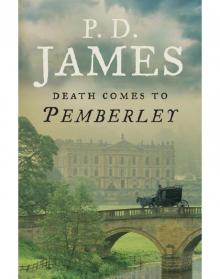 Death Comes to Pemberley
Death Comes to Pemberley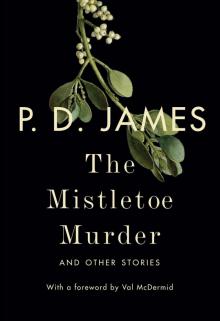 The Mistletoe Murder
The Mistletoe Murder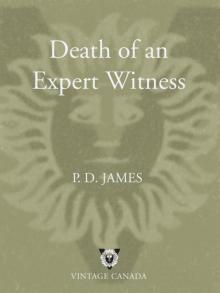 Death of an Expert Witness
Death of an Expert Witness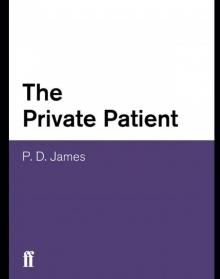 The Private Patient
The Private Patient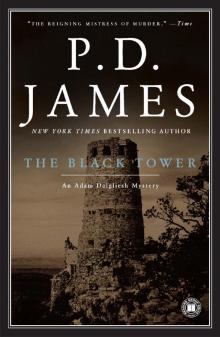 The Black Tower
The Black Tower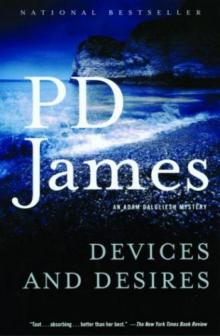 Devices & Desires - Dalgleish 08
Devices & Desires - Dalgleish 08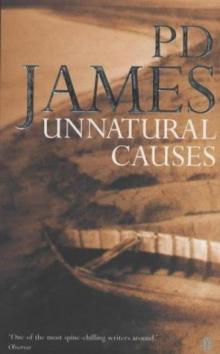 Unnatural Causes
Unnatural Causes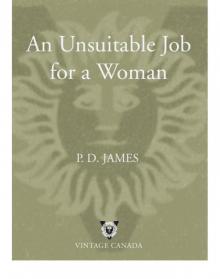 An Unsuitable Job for a Woman
An Unsuitable Job for a Woman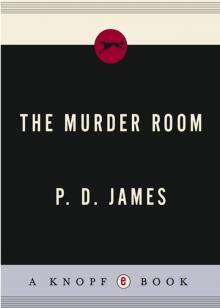 The Murder Room
The Murder Room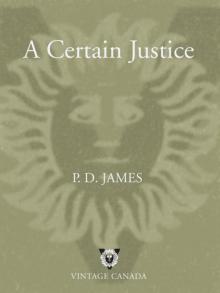 A Certain Justice
A Certain Justice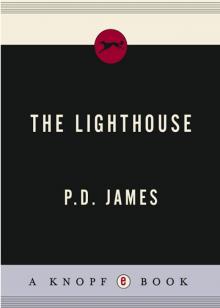 The Lighthouse
The Lighthouse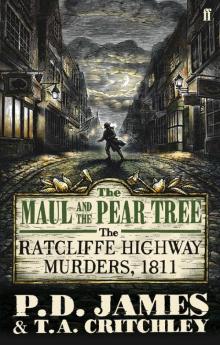 The Maul and the Pear Tree
The Maul and the Pear Tree